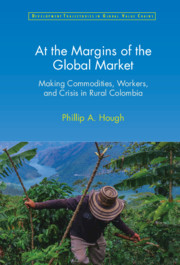Book contents
- At the Margins of the Global Market
- Development Trajectories in Global Value Chains
- At the Margins of the Global Market
- Copyright page
- Contents
- Figures and Tables
- Acknowledgments
- Introduction
- 1 Toward a Sociology of Labor and Development at the Margins of the Market
- Case Study #1 The Rise and Fall of Hegemony in the Coffee Regime of Viejo Caldas
- Case Study #2 Despotism and Crisis in the Banana Regime of Urabá
- 4 The World Historical Origins of Despotism in Urabá
- 5 Despotism, Crisis, and the Social Contradictions of Peripheral Proletarianization in Urabá
- Case Study #3 The Rise and Fall of FARC Counter-Hegemony in the Coca Regime of Caquetá
- Conclusion
- Appendix
- References
- Index
5 - Despotism, Crisis, and the Social Contradictions of Peripheral Proletarianization in Urabá
from Case Study #2 - Despotism and Crisis in the Banana Regime of Urabá
Published online by Cambridge University Press: 07 January 2022
- At the Margins of the Global Market
- Development Trajectories in Global Value Chains
- At the Margins of the Global Market
- Copyright page
- Contents
- Figures and Tables
- Acknowledgments
- Introduction
- 1 Toward a Sociology of Labor and Development at the Margins of the Market
- Case Study #1 The Rise and Fall of Hegemony in the Coffee Regime of Viejo Caldas
- Case Study #2 Despotism and Crisis in the Banana Regime of Urabá
- 4 The World Historical Origins of Despotism in Urabá
- 5 Despotism, Crisis, and the Social Contradictions of Peripheral Proletarianization in Urabá
- Case Study #3 The Rise and Fall of FARC Counter-Hegemony in the Coca Regime of Caquetá
- Conclusion
- Appendix
- References
- Index
Summary
This chapter analyzes how Urabá’s despotic labor regime shifted to a deep crisis of labor control in the 1980s and then returned to despotism in the 1990s. It argues that that shift to crisis was not due to any significant changes to the international banana market, as was the case for Colombia’s coffee regime of Viejo Caldas. Instead, it was caused by the democratization of Colombia’s political system, which opened up new spaces for labor mobilization and worker’s political participation. In Urabá, however, this democratization process undermined Augura authoritative power over the region’s banana plantations and local political offices and therefore threatened to undermine their capacity to adapt to their peripheral niche in the international banana market. By the 1990s, Augura was able to regain control of the banana labor regime facilitating the paramilitarization of the region. I conclude with a discussion of how the rise of paramilitarism in Urabá was not the result of Colombia’s adoption of neoliberal reforms, but was instead a regional solution to peripheralization in the context of political democratization.
Keywords
- Type
- Chapter
- Information
- At the Margins of the Global MarketMaking Commodities, Workers, and Crisis in Rural Colombia, pp. 179 - 208Publisher: Cambridge University PressPrint publication year: 2022

